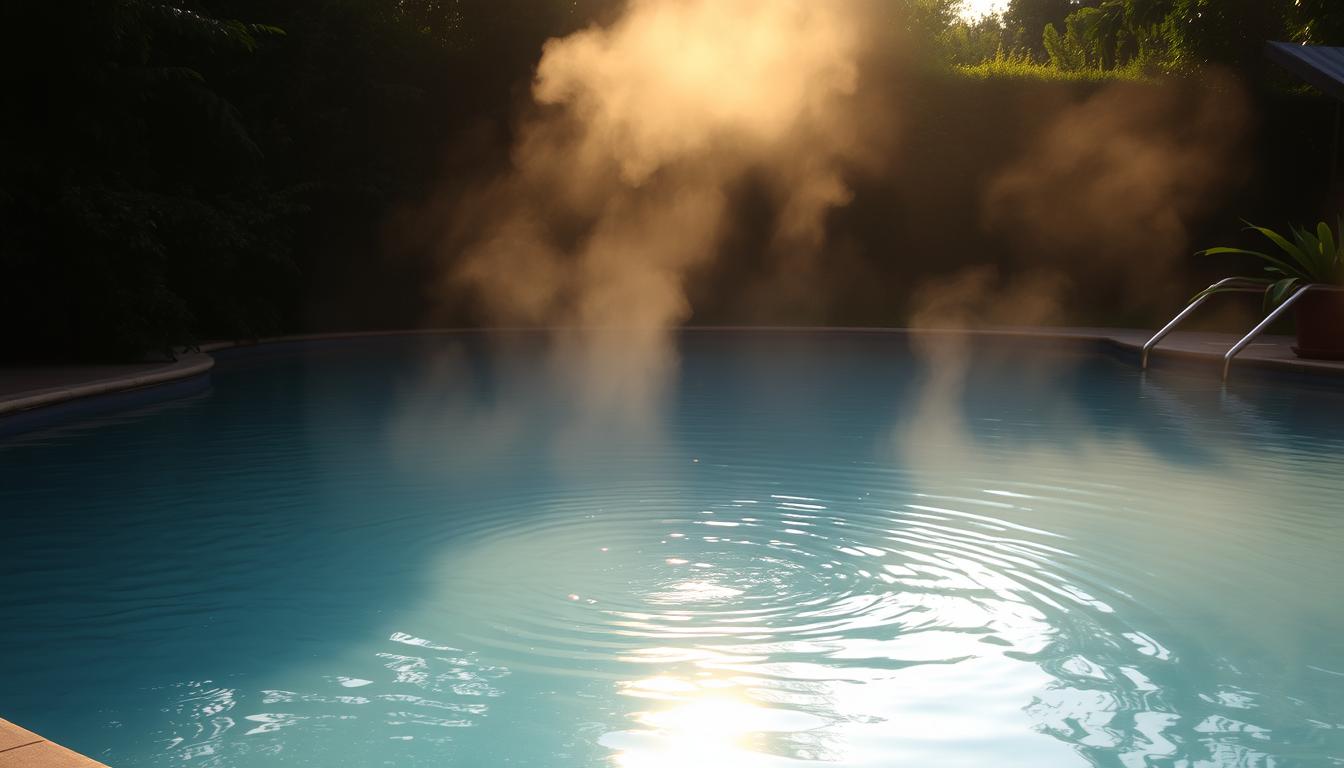
Pool heating time varies based on climate, size, and energy-efficient methods. Factors like covers and insulation play a role. Let’s explore how long it takes for outdoor pools to warm up naturally.
Natural pool warming is a cost-effective way to enjoy comfortable swimming. The ideal temperature range is 78°F to 82°F. Warmer climates may heat pools in hours, while cooler regions need more time.
Location and pool features affect heating time significantly. Some pools may take a day or more to reach the desired temperature.
Key Takeaways:
- Natural pool heating time varies based on factors like climate, pool size, and insulation
- Smaller pools heat up faster than larger ones due to the lower volume of water
- Warmer climates with abundant sunshine reduce heating time compared to cooler regions
- Pool covers and proper insulation can significantly decrease the time required for natural heating
- Patience and consistent monitoring are key to achieving the ideal pool temperature naturally
Factors Influencing Natural Pool Heating Time
Several factors affect how long it takes to heat your outdoor pool naturally. Understanding these elements helps optimize natural pool warming. This knowledge leads to a more comfortable swimming experience.
Pool Size and Volume
The size and volume of your pool impact heating time significantly. Larger pools need more time and energy to warm up. Smaller pools heat up faster, requiring less energy.
| Pool Size (Gallons) | Average Heating Time (Hours) |
|---|---|
| 10,000 | 6-36 |
| 15,000 | 8-48 |
| 20,000 | 10-60 |
| 30,000 | 15-90 |
Local Climate and Weather Conditions
Your local climate and weather affect pool heating time. Colder climates with less sunshine make heating take longer. Warmer areas with lots of sun heat pools faster.
Cloudy days and cold nights can cause pool temperatures to drop quickly. This makes it harder to maintain a comfortable swimming temperature.
Pool Covers and Insulation
Pool covers are crucial for heating efficiency. They reduce heat loss from evaporation, a major cause of energy waste. Covers help retain heat added during the day.
Better insulated pools keep heat more effectively. This reduces heating demands and shortens warming time. Good insulation makes natural heating more efficient.
Using a pool cover can reduce evaporation by up to 95%, significantly decreasing the time and energy needed for natural pool warming.
Considering pool size, local climate, and using covers improves natural heating. These factors help optimize pool solar heating systems. They lead to more efficient and comfortable outdoor pool temperatures.
How Long Does It Take for a Pool to Heat Up Naturally?
Heating your pool naturally can take varying amounts of time. An average-sized pool of 15,000-20,000 gallons in moderate climate takes 8-48 hours. This raises the temperature by 10-20 degrees Fahrenheit.
Average Heating Time Based on Starting Temperature
Your pool’s starting temperature greatly affects heating time. A pool at 70°F will heat faster than one at 50°F. The ideal swimming temperature is around 80°F.
| Starting Temperature (°F) | Desired Temperature (°F) | Estimated Heating Time (Hours) |
|---|---|---|
| 50 | 80 | 36-48 |
| 60 | 80 | 24-36 |
| 70 | 80 | 12-24 |
Comparing Natural Heating Time to Other Heating Methods
Natural pool heating is slower than using gas heaters, electric heat pumps, or solar systems. Each method has its pros and cons.
- Gas heaters offer rapid heating regardless of weather conditions but may have higher operational costs.
- Electric heat pumps are more energy efficient than gas heaters but can be slower and dependent on ambient temperatures.
- Solar heating systems are eco-friendly and cost-effective in the long run but require sufficient sunlight exposure and can have variable heating times based on weather and season.
The key to energy efficient pool heating is finding the right balance between your desired pool temperature, the time it takes to achieve that temperature, and the costs associated with your chosen heating method.
Understanding pool heating factors helps you make smart choices. You can heat your pool effectively and efficiently with the right method.
Conclusion
Natural pool heating depends on factors like size, climate, and weather. A moderate-sized pool in temperate weather can warm 10-20°F in 8-48 hours. This method is energy-efficient and cost-effective, though slower than artificial heating.
Pool covers and insulation can speed up natural warming. They reduce heat loss, leading to faster heating and lower energy use. Placing the pool in a sunny, wind-protected area also helps.
Natural heating is a sustainable option for pool owners. It may be slower, but it’s eco-friendly and budget-friendly. Understanding these factors helps create a comfortable swimming experience.







